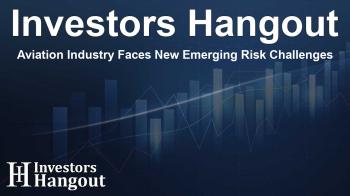Aviation Industry Faces New Emerging Risk Challenges

Understanding the Current Landscape of Aviation Risks
In a recent report involving 130 senior aviation professionals, it is evident that the aviation sector is grappling with various emerging risks that are set to alter its landscape in the coming decade. Despite the extensive expertise among the executives, only half express confidence in their strategies to navigate the complex risk environment. Alarmingly, just 30% believe their current plans will remain relevant over the next ten years.
Key Findings from the Report
The report highlights critical areas of concern where many leaders in the aviation industry feel unprepared. A staggering 80% of decision-makers are unclear about their organization's definition of emerging risks, and nearly half cannot pinpoint their top five risks. As we look deeper into the emerging challenges, several key areas emerge:
Climate Change and Its Implications
Climate change poses a significant threat, affecting various aspects such as operational resilience and financial stability. Aviation operators, particularly airports and cargo handlers, are markedly vulnerable to the risks that climate change brings. Roughly 29% of surveyed executives rank climate change among their top five emerging risks. Additionally, 20% foresee climate transition as a leading risk in the next couple of years, while 50% acknowledge its importance over the next decade.
The Impact of Geopolitical and Economic Factors
Another area of concern revolves around geopolitical and economic risks. These factors are increasingly interlinked and are considered crucial in shaping business opportunities and strategies. The aviation industry faces threats from financial instability and government policies, impacting trade and operations. Additionally, there's a growing recognition of insurance gaps, indicating a demand for better economic risk transfer solutions. These geopolitical and economic challenges rank prominently across various timeframes, underscoring their importance.
Cybersecurity: A Persisting Threat
The aviation industry is also a prime target for cybercriminals, providing critical national infrastructure that is indispensable for safety and operations. Approximately 11% of industry stakeholders view cybersecurity as an immediate concern, on par with supply chain risks. As technology continues to evolve, the intersection between AI advancements and cybersecurity also plays a vital role in shaping future strategies.
Navigating AI in the Aviation Sector
Artificial Intelligence (AI) emerges as a double-edged sword. While 36% of executives highlight it as a current risk, its significance may diminish over time. The challenge lies in how organizations balance utilizing AI to enhance operations versus the risks associated with its adoption. An airport executive insightfully remarked on the dual-edged risks of embracing versus neglecting AI—illustrating the need to leverage technology to improve insights and minimize risks in aviation.
Future Directions and Strategies
The complex nature of the aviation industry necessitates a shift in strategy when addressing these emerging risks. John Rooley, CEO of Willis Aviation & Space, emphasizes the need for a fundamental re-evaluation of how to manage these interconnected risks. Aviation has long excelled in long-term planning, but adapting to the evolving risk landscape is paramount. It’s time for leaders to embrace proactive strategies that foster adaptability and resilience.
The Role of WTW in Supporting Aviation
WTW (NASDAQ: WTW) plays a pivotal role in providing insights and solutions geared towards enhancing organizational resilience in the aviation sector. With operations spanning 140 countries, WTW offers a unique blend of local expertise and global perspective. The organization strives to help clients navigate through risks, offering data-driven strategies that lead to sustainable success.
Frequently Asked Questions
What are the main emerging risks facing the aviation industry?
The aviation industry faces several emerging risks, including climate change, geopolitical instability, cyber threats, and challenges related to artificial intelligence.
Why are aviation executives concerned about climate change?
Climate change is viewed as a critical threat that impacts operational resilience, financial performance, and stakeholder trust within the aviation sector.
How significant are geopolitical and economic risks for aviation companies?
Geopolitical and economic risks greatly influence business opportunities and plans. These factors rank among the top emerging risks for aviation in both the short and long term.
What role does AI play in aviation risk management?
AI presents both opportunities and risks in aviation. While it can enhance operational insights, it also poses challenges if not implemented carefully.
How can WTW support aviation organizations?
WTW provides data-driven solutions designed to improve risk management, organizational resilience, and performance improvement for aviation companies.
About The Author
Contact Hannah Lewis privately here. Or send an email with ATTN: Hannah Lewis as the subject to contact@investorshangout.com.
About Investors Hangout
Investors Hangout is a leading online stock forum for financial discussion and learning, offering a wide range of free tools and resources. It draws in traders of all levels, who exchange market knowledge, investigate trading tactics, and keep an eye on industry developments in real time. Featuring financial articles, stock message boards, quotes, charts, company profiles, and live news updates. Through cooperative learning and a wealth of informational resources, it helps users from novices creating their first portfolios to experts honing their techniques. Join Investors Hangout today: https://investorshangout.com/
The content of this article is based on factual, publicly available information and does not represent legal, financial, or investment advice. Investors Hangout does not offer financial advice, and the author is not a licensed financial advisor. Consult a qualified advisor before making any financial or investment decisions based on this article. This article should not be considered advice to purchase, sell, or hold any securities or other investments. If any of the material provided here is inaccurate, please contact us for corrections.

